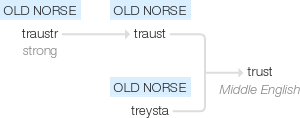Trust
Middle English: from Old Norse traust, from traustr ‘strong’; the verb from Old Norse treysta, assimilated to the noun.
wiktionary
From Middle English trust(“trust, protection”), from Old Norse traust(“confidence, help, protection”), from Proto-Germanic *traustą, from Proto-Indo-European *drowsdom, from Proto-Indo-European *deru-(“be firm, hard, solid”).
Akin to Danish trøst, tröst(“trust”), Saterland Frisian Traast(“comfort, solace”), West Frisian treast(“comfort, solace”), Dutch troost(“comfort, consolation”), German Trost(“comfort, consolation”), Gothic trausti( trausti, “alliance, pact”). More at true, tree.
etymonline
trust (n.)
c. 1200, "reliance on the veracity, integrity, or other virtues of someone or something; religious faith," from Old Norse traust "help, confidence, protection, support," from Proto-Germanic abstract noun *traustam (source also of Old Frisian trast, Dutch troost "comfort, consolation," Old High German trost "trust, fidelity," German Trost "comfort, consolation," Gothic trausti "agreement, alliance"), from Proto-Germanic *treuwaz, source of Old English treowian "to believe, trust," and treowe "faithful, trusty," from PIE root *deru- "be firm, solid, steadfast."
from c. 1300 as "reliability, trustworthiness; trustiness, fidelity, faithfulness;" from late 14c. as "confident expectation" and "that on which one relies." From early 15c. in legal sense of "confidence placed in a one who holds or enjoys the use of property entrusted to him by its legal owner;" mid-15c. as "condition of being legally entrusted." Meaning "businesses organized to reduce competition" is recorded from 1877. Trust-buster is recorded from 1903.
trust (v.)
c. 1200, from Old Norse treysta "to trust, rely on, make strong and safe," from traust (see trust (n.)). Related: Trusted; trusting.
